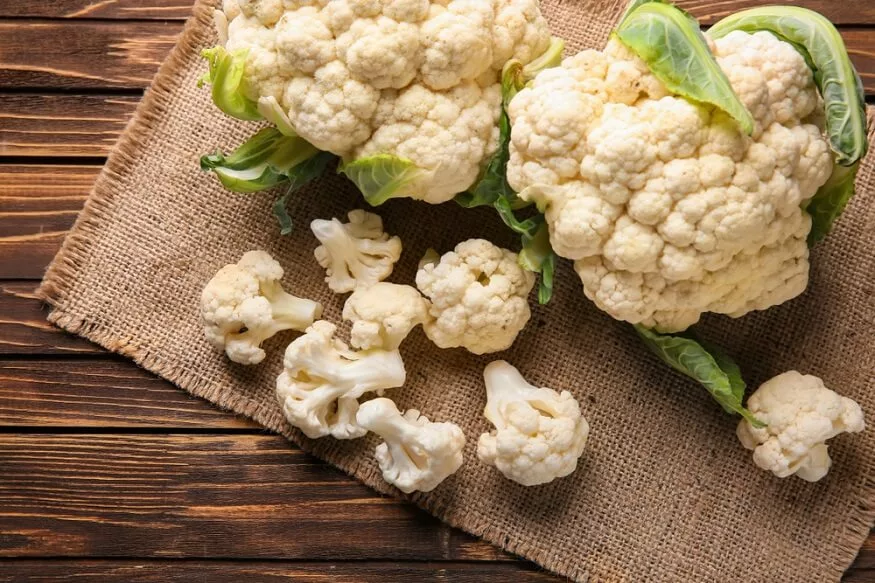Most commonly found in most Indian kitchens; Cauliflower, the cruciferous vegetable is a nutrient superstar. One can eat cauliflower raw, roasted, cooked, grilled, or even as a pizza crust! In this blog, we will break down these 14 amazing health benefits of cauliflower.
Also read : How Broccoli Can Be a Superfood for Kids
Nutritional profile of cauliflower
107 grams (g), of raw cauliflower contains:
- Calories: 27
- 3 g of Fat
- 1 g of Sodium
- 3 g of Carbohydrates
- 1 g of Fiber
- 2g of Sugars
- 1 g of Protein
- 6 g of Vitamin C
- 2 mg of Vitamin B6
- 16 mg of Magnesium
- 9 mg of Potassium
- 61 mcg of Folate
- 4 mg of Choline
- 6 mcg of Vitamin K
It includes antioxidants:
- Isothiocyanates
- Glucosinolates
Health Benefits
Rich in micronutrients, antioxidants, and fibre, the cauliflower offers numerous health benefits.
1) Supports digestive health
Cauliflower provides a healthy dose of fibre. Even 3 grams of fibre per cup, can help
prevent constipation, diverticulitis, and inflammatory bowel disease.
2) Aids weight loss
Cauliflower aids weight loss through its low-calorie content, high fibre, and water content.
When used to replace higher-calorie foods, cauliflower helps with weight loss by creating a calorie deficit.
Cauliflower also has rich fibre content. In a single serving, it provides approximately 10% of the recommended daily fibre intake. A diet high in fibre can assist weight loss by promoting.
- Feelings of satiety
- Reducing food intake
- Delaying gastric emptying
Cauliflower contains 92% of water. Consuming water-rich cauliflower can help you feel full and subsequently decrease the amount of food consumed.
3) Boosts Heart Health
Incorporating cauliflower into your diet boosts heart health in the following ways:
Antioxidants:
- Lower the risk of heart disease
- Lower the oxidative stress levels in the body.
Potassium
- It helps regulate heartbeat and blood pressure.
4) Healthy Bones
Cauliflower promotes bone health through two ways:
Vitamin C: Helps in collagen production, essential for maintaining strong bones.
Vitamin K: Helps reduce the risk of bone problems like osteoporosis.
Other minerals in Cauliflower which contribute to maintaining healthy bones include:
- Magnesium
- Phosphorus
- Potassium
5) Enhances Brain Health
Cauliflower can be advantageous for brain health in the following ways:
Choline
- Helps in the production of neurotransmitters, vital in sending signals across nerve cells.
Antioxidants
- Counters oxidative stress,
- Prevents neurodegenerative disorders such as Alzheimer’s and Parkinson’s disease.
Also read : Teaching Kids About Leafy Greens and Their Iron Content
6) Omega-3
- Builds cognitive functions
- Enhances memory
7) Fights Cancer
Cauliflower contributes to cancer risk reduction by:
Sulforaphane
- Slows cancer cell growth in the colon and prostate.
Indole-3-carbinol
- Aids in making damaged or abnormal cells self-destruct, a process known as apoptosis
Dietary fibre
- Dietary fibre reduces the risk of colorectal cancer by adding bulk to stool, which decreases the time carcinogens are in contact with the intestinal wall.
8) Supports Detoxification
Cauliflower plays a role in detoxification through the following compounds:
Glucosinolates
- The breakdown products called metabolites support the body’s natural detoxification processes.
Sulforaphane
- It induces the body’s phase II detoxification enzymes, thereby aiding in the elimination of harmful toxins.
Indole-3-carbinol
- Promotes liver detoxification
- Eliminates toxins from the body
- Eliminates carcinogens
9) Improves Eye Health
Cauliflower helps in maintaining optimal eye health in the following ways:
Vitamin C
- Reduces the risk of cataracts and age-related macular degeneration (AMD)
- Produces collagen that supports the structure of the eye
- Aids in the healing of wounds and injuries to the eye
Antioxidants
- Zeaxanthin and lutein are found in the cauliflower that shields the eyes from harmful light.
Vitamin K
- It helps in the reduction of dark circles and enhances overall eye appearance.
Also read : 10 Brilliant Health Benefits of Cucumber for Kids
10) Supports Pregnancy
Cauliflower is abundant in essential nutrients that are necessary for a healthy pregnancy. It helps in the following ways:
Folic acid
- Prevents neural tube defects
- Reduces the risk of defects by over 70% in early pregnancy.
High Fibre
- Supports healthy digestion
- Wards off constipation
Vitamin K
- Aids blood clotting during labour
- Prevents postpartum haemorrhage
11) Good for Skin
Cauliflower helps in good skin in the following ways:
Vitamin C
- Aids in collagen formation
- Promotes skin elasticity
- Reduces signs of ageing and wrinkles.
Dietary fibre
- Flushes toxins from the body
- Prevents acne and breakouts.
Choline
- Maintains the integrity of cell membranes
- Protects the skin against harmful substances.
12) Improves immunity
With a high content of phytochemicals and antioxidants, cauliflower defends the body from harmful substances, reducing inflammation and oxidative stress and strengthening the immune system.
The other contributing factor is choline, a vital nutrient that aids in maintaining a healthy gastrointestinal barrier, further enhancing immune response.
Also read : Boost Your Child’s Immune System with Healthy Smoothie Recipes
13) Prevents diabetes
Integrating cauliflower into your daily diet can significantly contribute to diabetes prevention in the following ways:
Low calories
- Aids in maintaining blood sugar levels
- Avoids glucose spikes.
Antioxidants
- Boost the body’s natural defence against oxidative stress
Vitamins B5 and B6
- Supports production of insulin
- Regulates metabolism
At EuroSchool we encourage a healthier approach to eating. We ensure healthy food choices and support their overall well-being.









